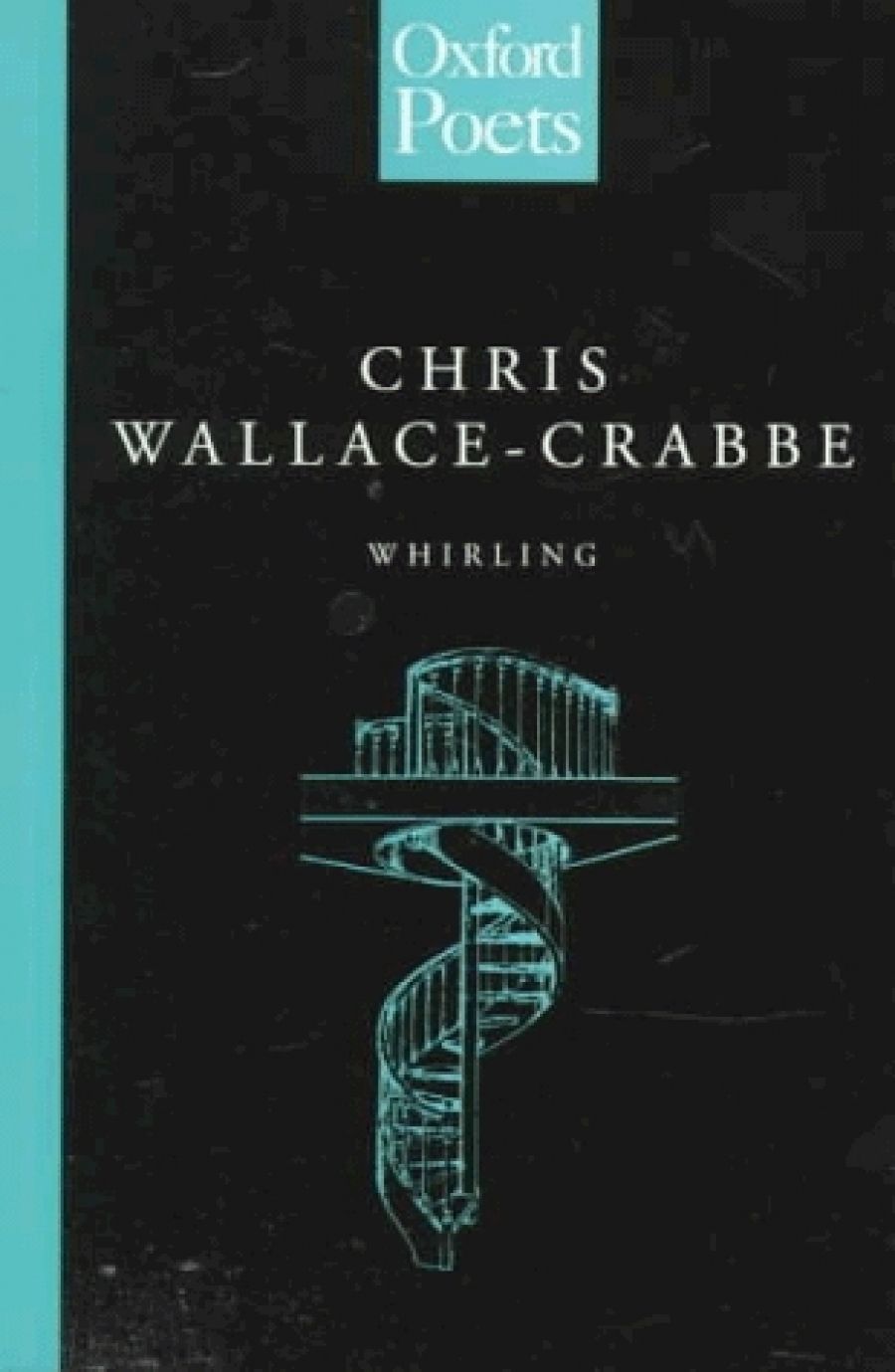
- Free Article: No
- Contents Category: Poetry
- Review Article: Yes
- Online Only: No
- Custom Highlight Text:
Chris Wallace-Crabbe’s ability to reveal the marvellous in the seemingly mundane layers of the quotidian is a striking aspect of this new book. There are compassionate, fluid meditations on many aspects of urban life, ageing, and a quirky cast of characters from the poet’s life and wide reading.
- Book 1 Title: Whirling
- Book 1 Biblio: OUP, $19.95 pb, 52 pp
Disillusionment and faith can share the same breath, as in ‘Glorying’
I don’t believe that misery can be
quite so brightly coloured
as happiness, at least not
on this cloud-marbled planet, this highly unlikely stage
for consciousness to prop and flutter.
These poems give me a palpable sense of Wallace-Crabbe’s desire to connect with and explore the tactile elements and pleasures of life: walking through the suburbs, the smells and textures of wood, flowers, yabbying … as well as the untouchable, irrecoverable elements of time and death, both experienced and imminent. They are marked by an integrity and responsibility when confronting the shifting nature of his world. One of the most poignant aspects of this book is the way Wallace-Crabbe has chronicled his attitudes to ageing and death. In the opening poem ‘Summers Breath’, dreams ‘chug along in second/like a T-model Ford.’ Blood is ‘clogged up with carbon or sulphur …’ and ‘New joints announce themselves in thigh and elbow …’.
The two poems for his dead son, ‘Erstwhile’ and ‘Years On’, are striking examples of powerful, lyrical elegies without a hint of sentimentality. Dead friends are celebrated with passion and warmth. One of my favourite poems, ‘Memories of Vin Buckley, Spelt from Sibyl’s Golden Leaves’ weaves Buckley’s larrikin nature into a short, musical narrative that is both humorous and bleak:
Once you fell
into the fireplace, dancing with Gwennie
among the aphorisms of claret-purple cronies;
and rose up unscorched, blinking.
I started to find poems that were scarred by a flat, riskless tone, and poems rendered lame by unlikely images: ‘the dustblue mountains were at rest/on memory’s eastern rim/like sheep.’ (‘Of Finite Hearts That Yearn’) ‘A tower of poplar has been lashing away /like damaged birds’ (‘Timber’).
In ‘Wanting to be a Sculptor’, he resorts to the list-maker’s easy rhetoric. Then Wallace-Crabbe ends the poem with: ‘that would be the shot’. This kind of phrase is scattered throughout the book. Wallace-Crabbe has settled for clichés and worn phrasing, instead of working to locate something more indelible, original. It may be that he has intentionally used these lines in a coupling of relaxed and intense language, but to my ear they sound like lazy choices – a rattle of deadwood. Some examples: ‘They, even they, can brood over ageing.’ ‘From here to kingdom come.’ ‘Laying them in the aisles.’ ‘Under the circumstances.’ ‘All of a sudden’ (used twice). ‘They have been sold a pup.’
And the syntax is often awkward, atonal, sucking the air out of a line: ‘Everyone except me could whistle in tune, / well, that was what it felt like back in the forties; / but, human history being the way it seems to be … ’ (‘The Whistle Stop’).
He can also lapse into sentimentality and purple prose, as in ‘An Equine Prospect’ that is like a poor copy of James Wright’s’ A Blessing’. Here, instead of clear observations fused with intense imagery, we find: ‘ … you see them all of a sudden / two glossy horses/fingered by the late sun’s copper rays.’ Towards the end of the poem, Wallace-Crabbe makes sure that any hint of magic has been cauterised by writing: ‘Goodbye, proud nags.’
It’s these small, intrusive lines or phrases that undercut poem after poem. Some have wonderful rhythm and music, such as ‘A Threshold for my Son’, where half-rhymes and enjambment work to create successful tension: ‘You touch the door now, trembling on its hinge / between vague adolescence and the dark / exciting world an adult stumbles in.’
But this is rare. By the end of this book I sensed most poems were written out of Wallace-Crabbe’s ability to craft a series of good lines, culminating in a book of competent poems, rather than poems written from where, as the poet Richard Hugo once said, ‘truth conforms to music.’
‘Summer’s Breath’, (parts of) ‘Timber’, ‘Erstwhile’, ‘Memories of Vin Buckley, Spelt From Sibyl’s Golden Leaves’, ‘Years On’, ‘A Threshold For my Son’, ‘Yabbying’, and the big, risky prose poem ‘Snips of a Day’ (where time and rapid-fire thought run together, creating a collage of rich images and ideas) are the exceptions. I believe many more poems in Whirling would have been successful, memorable, had WallaceCrabbe located and removed the trail of discordant elements that eat away at the potential, overall music of the work.


Comments powered by CComment